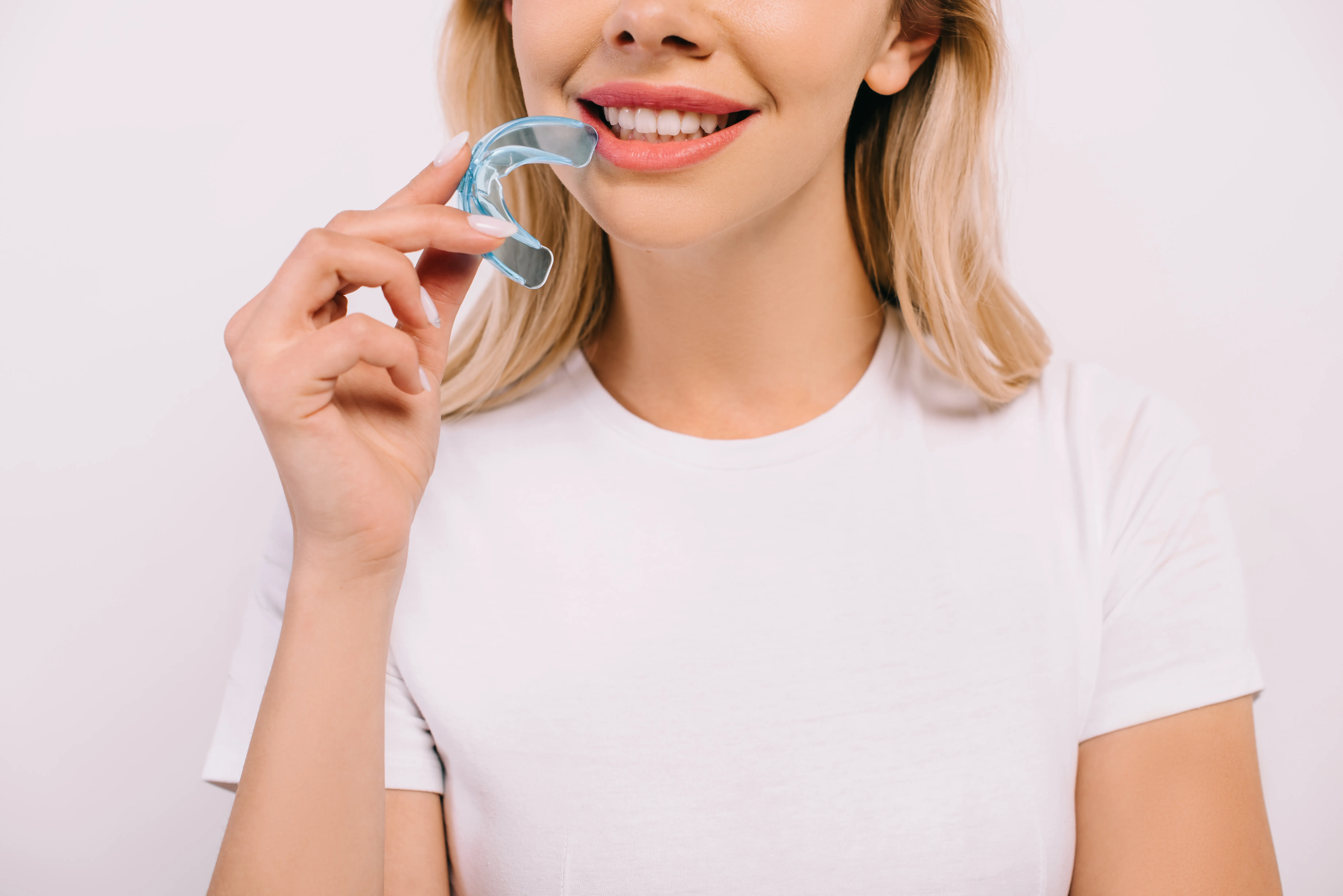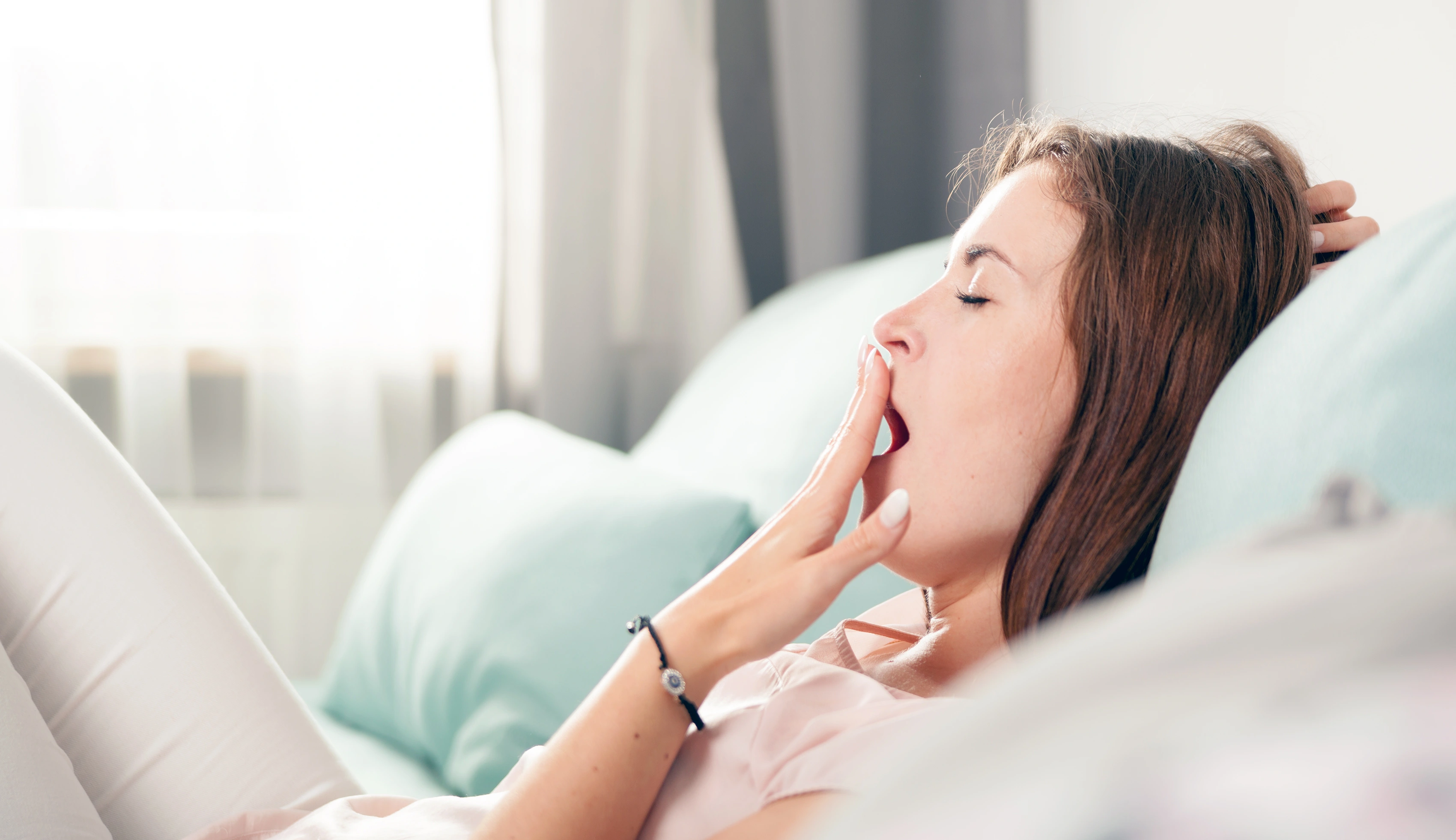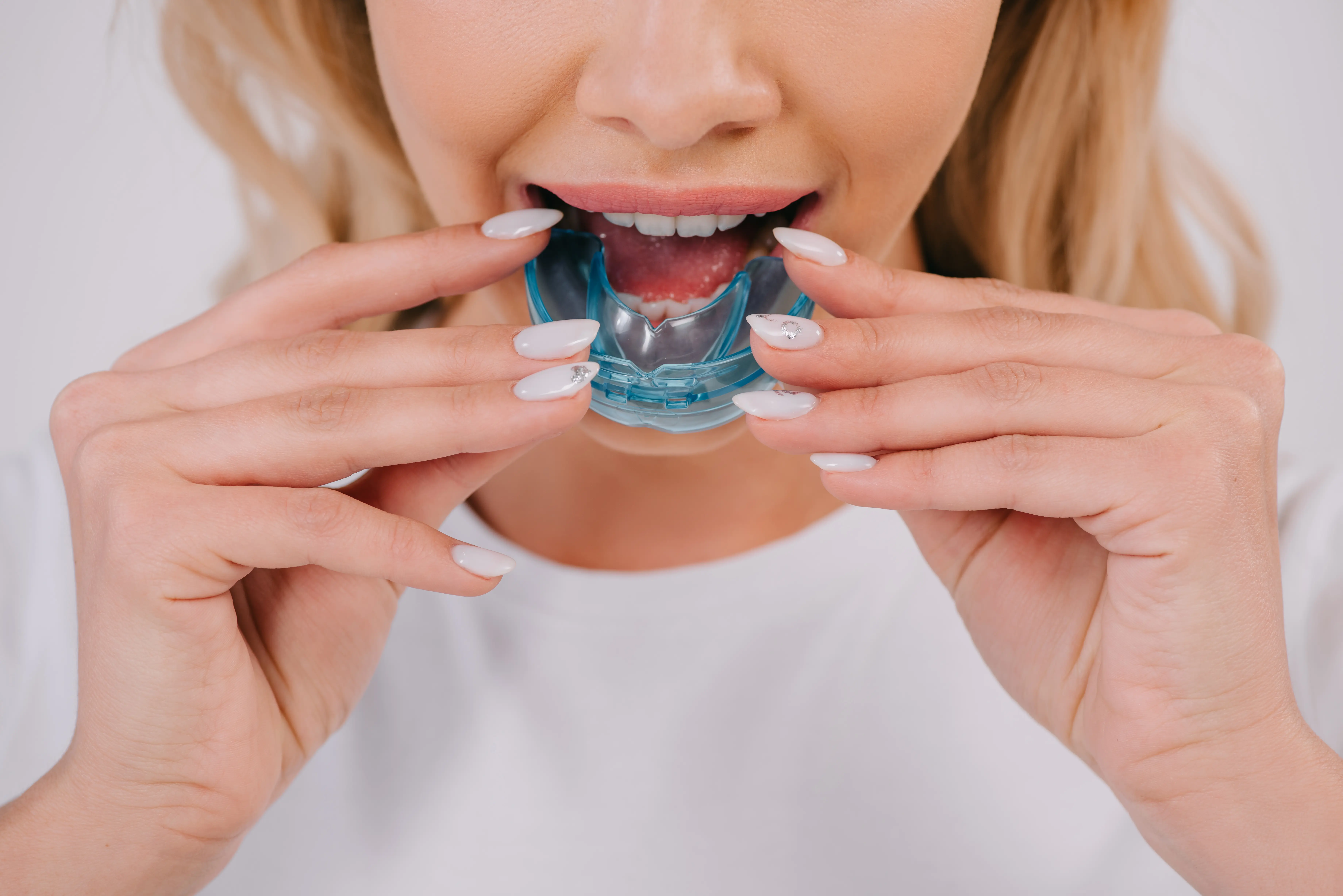Sleep apnea is more than just loud snoring or restless nights; it's a serious sleep disorder that can affect your breathing, heart health, and overall well-being. While continuous positive airway pressure (CPAP) machines are a common treatment, they’re not always comfortable or convenient for everyone.
That’s where sleep apnea mouth guards come in. These small, wearable devices offer a simpler, quieter alternative by helping keep your airway open while you sleep.
In this article, we’ll explore how they work, the different types available, and who might benefit most from using one.
What Are Sleep Apnea Mouth Guards?
A Sleep apnea mouth guard, which is also referred to as an oral device for sleep apnea, is a specially designed device that is worn in the mouth during sleep to help manage obstructive sleep apnea (OSA).
They’re a popular alternative to CPAP therapy, especially for those with mild to moderate cases or people who find CPAP machines uncomfortable. These mouth guards help prevent airway collapse, which is a common cause of disrupted breathing during the night.
How Do Sleep Apnea Mouth Guards Work?
These devices work by adjusting the position of key structures in your mouth and throat. Most commonly, they move the lower jaw slightly forward, which helps keep the airway open and reduces the likelihood of soft tissues blocking airflow.
Some devices hold the tongue in place to prevent it from falling back and obstructing the throat. By maintaining a clearer airway, mouth guards can reduce snoring and improve breathing throughout the night.
Benefits of Using a Sleep Apnea Mouth Guard

Sleep apnea mouth guards offer several advantages, especially for those looking for a low-maintenance and less bulky alternative to traditional CPAP therapy. While they may not be suitable for everyone, many people find these devices easier to use and just as effective for mild to moderate cases.
Less Invasive Than CPAP
CPAP machines work by delivering constant airflow through a mask, which can feel restrictive or uncomfortable for many users. In contrast, a mouth guard for sleep apnea is a small device that fits inside the mouth, no mask, no wires, no forced air.
It simply repositions your jaw or tongue to keep your airway open. This makes it far less intrusive and easier to get used to, especially for those new to sleep apnea treatment.
Portable and Travel-Friendly
CPAP machines can be bulky and inconvenient to travel with, especially if you're flying, camping, or have limited luggage space. A mouth guard, on the other hand, fits in a small case and takes up virtually no room.
You can carry it in your bag without the need for outlets, distilled water, or tubing. It’s an ideal choice for frequent travelers or people with active lifestyles.
No Noise or Hoses
Unlike CPAP machines, which can produce noise from airflow or mask leaks, mouth guards are completely silent. They also eliminate the need for hoses and masks, which some users find claustrophobic or disruptive, eliminating any triggers for sleep apnea headaches.
With a mouth guard, there’s nothing between you and a quiet, comfortable night’s sleep, beneficial for both you and your sleeping partner.
Custom-Fit for Comfort
Custom mouth guards for sleep apnea are made specifically for your teeth and jaw alignment. A sleep dentist or orthodontist typically takes an impression of your mouth and creates a device that fits snugly and securely.
This tailored fit enhances comfort and helps ensure the device stays in place all night, minimizing irritation and improving results. Custom devices are also more durable than over-the-counter alternatives.
Improves Sleep and Daytime Alertness
By preventing airway blockage, mouth guards help you maintain steady breathing throughout the night, reducing apneas and frequent awakenings. This translates to deeper, more restorative sleep and fewer interruptions.
Over time, consistent use can reduce symptoms like excessive daytime sleepiness, difficulty concentrating, and morning headaches, common side effects of untreated sleep apnea.
Affordable Option
Mouth guards, especially boil-and-bite or OTC models, are typically less expensive than CPAP machines, which often require ongoing costs for replacement parts, masks, filters, and maintenance.
Although custom-fitted devices are more expensive initially, they can be a more budget-friendly long-term option, particularly if insurance coverage is available. Plus, they require little upkeep and no electricity, further reducing associated costs.
Who Should Use a Mouth Guard for Sleep Apnea?

Sleep apnea mouth guards aren’t for everyone, but they can be a great option for certain individuals. If you fall into one of the categories below, an oral appliance might be a practical and effective solution:
- Have Mild to Moderate OSA: Mouth guards are most effective for people with mild to moderate obstructive sleep apnea (OSA), where the airway collapses or becomes blocked during sleep. In these cases, an oral appliance can significantly reduce symptoms and improve sleep quality without the need for more complex equipment.
- Experience Primary Snoring without Apnea: Even if you don’t have sleep apnea, mouth guards can still be beneficial if you suffer from chronic snoring. By repositioning the jaw or tongue, these devices help keep the airway open and reduce the vibrations that cause snoring, leading to quieter nights for you and your partner.
- Can’t Tolerate CPAP Therapy: CPAP intolerance is common, with many users struggling with mask discomfort, dry mouth, air leaks, or feeling claustrophobic. For those who can’t stick with CPAP but still need treatment, mouth guards offer a user-friendly and non-invasive alternative.
- Prefer a Less Bulky Solution: Oral appliances are compact, quiet, and easy to use. If you want something that doesn’t require a power source, tubing, or a nightly setup routine, a mouth guard provides a more streamlined way to manage your symptoms, especially for people who prioritize convenience or travel frequently.
Types of Mouth Guards for Sleep Apnea
Sleep apnea mouth guards come in a few different forms, each designed to help keep your airway open and improve nighttime breathing.
Mandibular Advancement Devices (MADs)
MADs are the most commonly used type of mouth guard for sleep apnea. They work by gently shifting the lower jaw (mandible) forward, which helps tighten the soft tissues and muscles around the airway to prevent collapse.
This repositioning increases airway space and reduces snoring and breathing interruptions. Custom MADs, fitted by a dentist, are generally more effective and comfortable than generic versions. Some models also allow for gradual jaw advancement, which can be adjusted over time for better results.
Tongue Retaining Devices (TRDs)
TRDs work differently from MADs by focusing on tongue positioning rather than jaw movement. These devices hold the tongue in a forward position using gentle suction, which helps prevent it from falling back into the throat during sleep, a common cause of airway blockage.
TRDs are often recommended for people who can’t tolerate jaw advancement or have dental issues that prevent the use of MADs. They're also a good option for those with fewer teeth or who wear dentures.
Over-the-Counter (Boil-and-Bite) Devices
OTC mouth guards are a more accessible and budget-friendly option. These devices are typically made from thermoplastic materials that soften in hot water, allowing you to mold them to your teeth at home.
While they can help with mild snoring or mild sleep apnea, they may not offer the same level of precision, comfort, or durability as custom-fitted versions. Still, beneficial can be a good starting point for someone exploring oral appliance therapy before committing to a professionally made device.
Potential Side Effects

Sleep apnea mouth guards are a helpful solution for many people, offering relief from snoring and nighttime breathing issues. However, like any treatment, they come with potential drawbacks. Some users may experience mild discomfort or adjustment issues, especially in the beginning.
While most side effects are manageable and often temporary, it’s important to understand what to expect before starting. Being aware of these possibilities can help you make a more informed decision and address any concerns early on.
Jaw or Tooth Discomfort
Since many mouth guards work by repositioning the jaw, some users experience soreness or discomfort in their jaw muscles or teeth, especially during the initial adjustment period.
This discomfort usually lessens over time, but persistent pain may require device adjustments or consultation with a dental professional.
Dry Mouth or Drooling
Wearing a device in your mouth throughout the night can affect saliva flow. Some users experience dry mouth, which can cause irritation or bad breath.
Others may find that the device increases saliva production, leading to drooling. Proper hydration and regular dental checkups can help manage these symptoms.
May Worsen TMJ Issues
People with temporomandibular joint (TMJ) disorders should use caution, as mandibular advancement devices can sometimes aggravate jaw joint pain or dysfunction. If you have TMJ problems, discuss this with your dentist or sleep specialist before choosing a mouth guard.
If you’re experiencing jaw tension or TMJ discomfort from wearing a mouth guard, a supportive pillow can help cushion your jaw and align your neck during sleep.
Not Always Covered by Insurance
While some insurance plans and medical benefits cover custom-fitted oral appliances, coverage varies widely. Over-the-counter devices are generally not covered. It’s important to check your insurance policy and understand potential out-of-pocket costs before purchasing a mouth guard.
Less Effective for Severe OSA
Mouth guards for sleep apnea tend to work best for mild to moderate cases. For severe obstructive sleep apnea, they may not provide sufficient airway support, and CPAP therapy or other treatments might be necessary. A sleep study and medical consultation are essential to determine the right treatment plan.
How to Minimize Side Effects
Using a sleep apnea mouth guard doesn’t have to be uncomfortable. Here are some practical tips to help reduce common side effects and improve your experience:
- Start with Shorter Wear Times: Begin by wearing the device for a few hours during the day or for part of the night. Gradually increase the duration as your mouth and jaw get used to the appliance. This can help reduce soreness and make the adjustment period smoother.
- Use a Moisturizing Gel or Spray: To combat dry mouth caused by wearing a mouth guard, consider using a moisturizing gel or oral spray before bed. Staying well-hydrated during the day and using a humidifier at night can also help keep your mouth comfortable.
- Ensure Proper Fit with Professional Adjustments: A well-fitted mouth guard is key to comfort and effectiveness. If you experience discomfort or persistent pain, visit your dentist for adjustments. Avoid trying to modify the device yourself, as improper changes can worsen issues.
Caring for Your Sleep Apnea Mouth Guard
Proper care of your sleep apnea mouth guard helps maintain its effectiveness, hygiene, and durability. Follow these simple steps to keep your device in good condition:
- Rinse after Each Use: After taking out your mouth guard in the morning, rinse it thoroughly with cool water to remove saliva and debris. Avoid hot water, as it can warp the material.
- Brush Gently with Non-abrasive Toothpaste: Clean your mouth guard daily using a soft toothbrush and a mild, non-abrasive toothpaste or soap. This prevents the buildup of bacteria and keeps the device fresh without damaging its surface.
- Soak Weekly in Denture Cleaner: To deep clean and disinfect, soak your mouth guard once a week in a denture cleaning solution or an appropriate oral appliance cleaner. Follow the product instructions carefully to avoid damage.
- Store in a Ventilated Case: When not in use, keep your mouth guard in a clean, ventilated case to allow airflow and prevent moisture buildup, which can encourage bacterial growth.
FAQs
How Long Do Sleep Apnea Mouth Guards Last?
The lifespan of a mouth guard for sleep apnea depends on the type and how well it’s cared for. Custom-fitted devices typically last between 1 and 3 years with proper maintenance. Over-the-counter models may need replacement more frequently, often every 6 to 12 months, due to wear and tear or loss of fit.
Can a Mouth Guard Cure Sleep Apnea?
Mouth guards do not cure sleep apnea but can effectively manage symptoms, especially in mild to moderate cases. They work by keeping the airway open during sleep, reducing apnea episodes and snoring. For severe sleep apnea, other treatments like CPAP or surgery may be necessary.
Are There Side Effects to Using a Sleep Apnea Mouth Guard?
Yes, some users may experience side effects such as jaw or tooth discomfort, dry mouth, or exacerbation of TMJ issues. Most side effects are mild and improve with time or device adjustments. It’s important to work with a dental professional to ensure proper fit and address any concerns.
Conclusion
Sleep apnea mouth guards offer a convenient, non-invasive alternative to traditional treatments like a CPAP mouthpiece, especially for those with mild to moderate obstructive sleep apnea or persistent snoring. With options ranging from custom-fitted devices to over-the-counter models, many people can find a solution that fits their lifestyle and comfort needs.
While some side effects may occur, proper use and care can minimize discomfort and enhance effectiveness. Always consult with a healthcare professional or sleep specialist to determine the best treatment plan for your specific condition and ensure optimal results.
Dom Abraham
As the lead content writer at Sleepiverse. Dom pours his heart into writing mattress reviews, bedding product reviews, and medically-reviewed health articles. Dom is from Portugal and likes to spend his free time writing on the beach as it gives him a sense of comfort. Aside from writing mattress reviews in front of the soothing beach view, Dom likes to experiment with new amazing food ideas.


